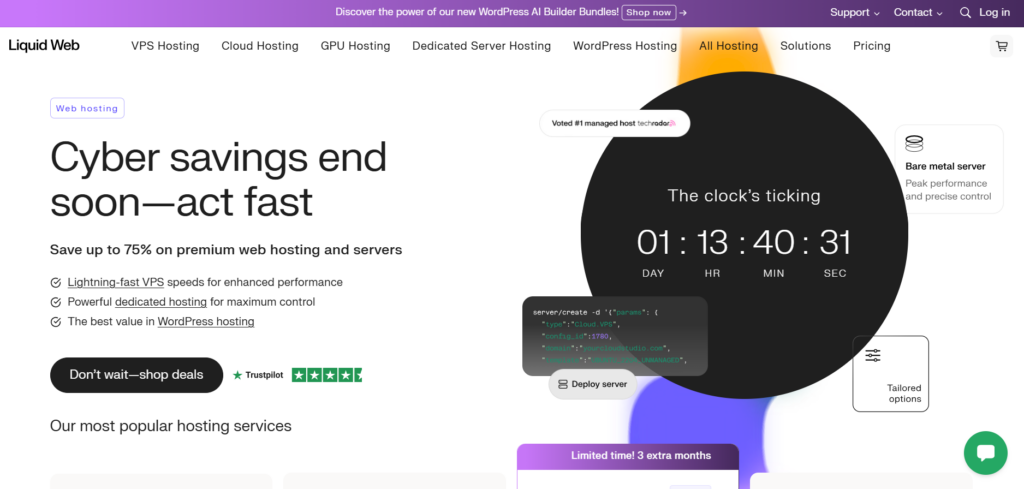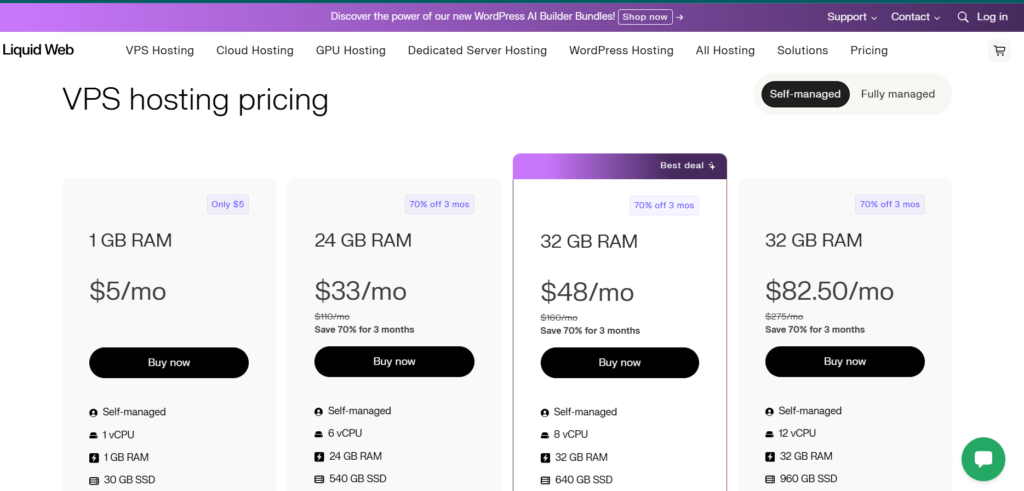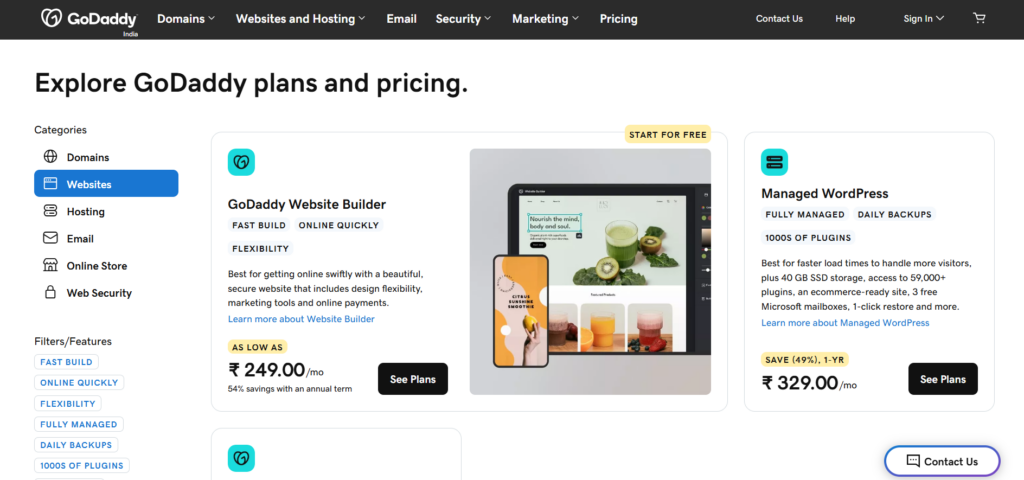When it comes to choosing the best web hosting provider, two names often come up: Liquid Web and GoDaddy. Both are popular, but they serve different types of customers.
Liquid Web is known for its powerful performance and premium features, often preferred by businesses that need high reliability and support.
On the other hand, GoDaddy is a household name, offering a range of affordable hosting options and easy-to-use tools for beginners and small businesses.
But which one is really the best for your website? In this comparison, we’ll look at the pros and cons of each, helping you decide which host fits your needs.
Whether you’re building a blog or a complex e-commerce site, let’s break down Liquid Web vs GoDaddy to help you make the right choice.
Liquidweb
Liquid Web is a managed hosting provider offering high-performance cloud hosting, dedicated servers, VPS hosting, and managed WordPress and WooCommerce solutions.

Catering to businesses of all sizes, Liquid Web is known for its robust infrastructure, exceptional customer support, and 99.999% uptime guarantee.
Its services are designed for mission-critical websites and applications, providing scalable solutions with advanced security and customization.
Liquid Web prioritizes reliability and performance, making it a trusted choice for developers, agencies, and enterprises seeking powerful hosting solutions.
GoDaddy
GoDaddy is a prominent web hosting and domain registration company, serving millions globally. Established in 1997, it provides a range of services, including website building, domain name sales, SSL certificates, and online marketing tools.

Known for its user-friendly interface, GoDaddy caters to small businesses, entrepreneurs, and individuals looking to establish an online presence.
With 24/7 customer support and scalable solutions, it’s a popular choice for hosting websites, email services, and managing digital identities. Its advertising and brand recognition are widely recognized in the tech industry.
Key Features: Liquid Web vs GoDaddy
When comparing Liquid Web and GoDaddy, it’s essential to assess their key features to determine which aligns better with your hosting needs. Here’s a comparison across six critical aspects:
1. Hosting Services Offered:
- GoDaddy: Provides a broad spectrum of services, including shared, VPS, dedicated, and WordPress hosting, catering to a wide range of customers from individuals to small businesses.
- Liquid Web: Specializes in high-performance managed hosting solutions such as VPS, dedicated servers, and managed WordPress hosting, focusing primarily on businesses requiring robust and reliable hosting environments.
2. Performance and Reliability:
- GoDaddy: Offers a 99.9% uptime guarantee, which is standard in the industry.
- Liquid Web: Provides a 100% uptime guarantee, ensuring maximum availability for your websites and applications.
3. Customer Support:
- GoDaddy: Offers 24/7 customer support, primarily through phone and chat, with varying response times.
- Liquid Web: Known for its “Heroic Support,” offering 24/7 access to highly trained technicians with rapid response times, ensuring prompt and effective assistance.
4. Security Features:
- GoDaddy: Offers basic security measures, with advanced features available at additional costs.
- Liquid Web: Includes robust security protocols, such as DDoS protection, integrated firewalls, and regular security audits, ensuring a secure hosting environment.
5. Scalability and Resources:
- GoDaddy: Provides scalable solutions suitable for small to medium-sized websites, with limitations on resource-intensive applications.
- Liquid Web: Delivers highly scalable resources capable of handling high-traffic and resource-demanding applications, making it ideal for growing businesses and enterprises.
Why Liquid Web May Be the Better Choice:
For businesses and professionals seeking superior performance, reliability, and comprehensive support, Liquid Web stands out due to its specialized managed hosting solutions, exceptional customer service, and commitment to security.
While it comes at a higher price point, the investment translates into enhanced uptime, faster load times, and a secure environment, which are critical for business success.
In contrast, GoDaddy’s services are more suited for individuals or small businesses with modest hosting needs and budgets, offering a broad range of services but with potential trade-offs in performance and support quality.
Ultimately, the choice depends on your specific requirements, budget, and the importance you place on performance, support, and security.
Pricing: Liquid Web vs GoDaddy
When evaluating the pricing structures of Liquid Web and GoDaddy, it’s crucial to consider the value each provider offers relative to their costs. Here’s a comparative overview:
Liquid Web Pricing:

1. Managed VPS Hosting:
Plans start at $25/month for 2GB RAM, 40GB SSD storage, and 10TB bandwidth. Higher-tier plans offer more resources at increased costs.
2. Dedicated Server Hosting:
Entry-level plans begin at $199/month, offering 16GB RAM and 2 x 240GB SSD storage. Advanced configurations are available at higher price points.
3. Managed WordPress Hosting:
Pricing starts at $19/month, providing optimized performance and security features.
GoDaddy Pricing:

1. Shared Hosting:
Economy plans start at $6.99/month for the first year, renewing at $8.99/month. Deluxe plans, which support unlimited websites, begin at $7.99/month initially, renewing at $11.99/month.
2. Website Builder Plans:
Basic plans are priced at $9.99/month (annual subscription), renewing at $12.99/month. Premium plans start at $14.99/month, renewing at $19.99/month.
3. Domain Services:
New domain registrations can be as low as $0.01 for the first year with a 3-year purchase. Domain transfers start at $11.99, including free registration for one year.
Why Liquid Web May Be the Better Choice:
While GoDaddy offers more affordable entry-level plans suitable for individuals and small businesses, Liquid Web provides premium managed hosting solutions designed for performance-intensive applications and businesses requiring high reliability.
Liquid Web’s plans include features like real-time monitoring, enhanced security protocols, and a 100% uptime guarantee, which can justify the higher cost for businesses where website performance and uptime are critical.
In summary, if your primary concern is budget-friendly hosting for a simple website, GoDaddy’s pricing may be more appealing.
However, if your business demands robust performance, superior support, and high reliability, investing in Liquid Web’s services could provide better long-term value.
The Final Verdict
Liquid Web outshines GoDaddy due to its superior performance, excellent customer support, and robust features tailored for businesses with demanding hosting needs.
While GoDaddy offers affordable basic plans, Liquid Web excels with fully managed hosting, higher uptime guarantees, faster load speeds, and specialized support for developers and enterprises.
Their custom server configurations, advanced security features, and 24/7 expert support make them the better choice for mission-critical applications, ensuring reliability and scalability for growing businesses.
FAQ’s
Which is better for small businesses?
GoDaddy offers budget-friendly plans for small businesses, while Liquid Web excels for growing enterprises with demanding hosting needs.
What about uptime guarantees?
Liquid Web provides a 100% uptime guarantee, compared to GoDaddy’s 99.9%.
Is customer support better on Liquid Web?
Yes, Liquid Web’s “Heroic Support” is renowned for fast, expert assistance, surpassing GoDaddy’s standard support.
Which is more cost-effective?
GoDaddy is cheaper upfront, but Liquid Web offers better long-term value for high-performance hosting.
Does Liquid Web offer shared hosting?
No, Liquid Web focuses on managed hosting solutions, while GoDaddy includes shared hosting options.


